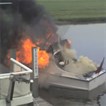All boaters using petrol, and especially anyone new to boating, should appreciate the nature of petrol vapour especially in the context of the bucket-like quality of a boat cabin and hull.
The fundamentals are that petrol, when spilt or exposed to open air, can vaporise quickly and the vapour can be ignited easily by any spark, flame, cigarette, etc.
Even a small spill of petrol will create a large amount of vapour. Likewise when it is being poured and when a tank is being filled, the vapour in the ‘empty’ tank is displaced by the new liquid fuel.
Escaping vapour will sink to the lowest level of its surroundings, accumulating at low level in places such as cabin floors, lockers, bilges and other ‘still-air’ spaces.
Even if the concentration of vapour is too rich to ignite immediately, it will dilute creating the potential for a serious fire and/or an explosion, even though, given enough ventilation, it may dissipate to a safe level eventually.
You can download our list of ten crucial petrol safety tips that will help keep you and your crew safe here. ![]()
 |
Spare petrol and its stowage. If you can avoid carrying spare fuel on your boat, the best and safest option is not to have any extra petrol aboard, but if spare fuel is a necessity, then there's some key points to be followed to help keep you safe. More details here |
 |
Some further points for boaters to consider Reducing the risks of fire and explosion from petrol can take a multi-layered approach. We have some further points boaters can consider More details here |
 |
Boats with inboard petrol engines Understanding the difference between the modern road vehicle experience, i.e. never lifting the bonnet; just climbing in, simply turning the key and setting off - and the very different experience for boats is crucial for enjoying petrol-engined boats safely. More details here |
 |
Journey preparation and setting off Many petrol incidents happen just before the boat sets off or shortly after it leaves the mooring. Taking this advice could keep you safe. More details here |
 |
Refuelling specifically Give petrol due respect every time the boat is fuelled, and it will remain safe, but inattention and sloppy handling of petrol can put people and property at risk. More details here |
 |
Petrol outboards and portable engines Small in size and portable by nature, it is too easy to forget that portable engines can still cause death and serious injury if basic precautions are not taken. More details here |
See more fire safety advice here
